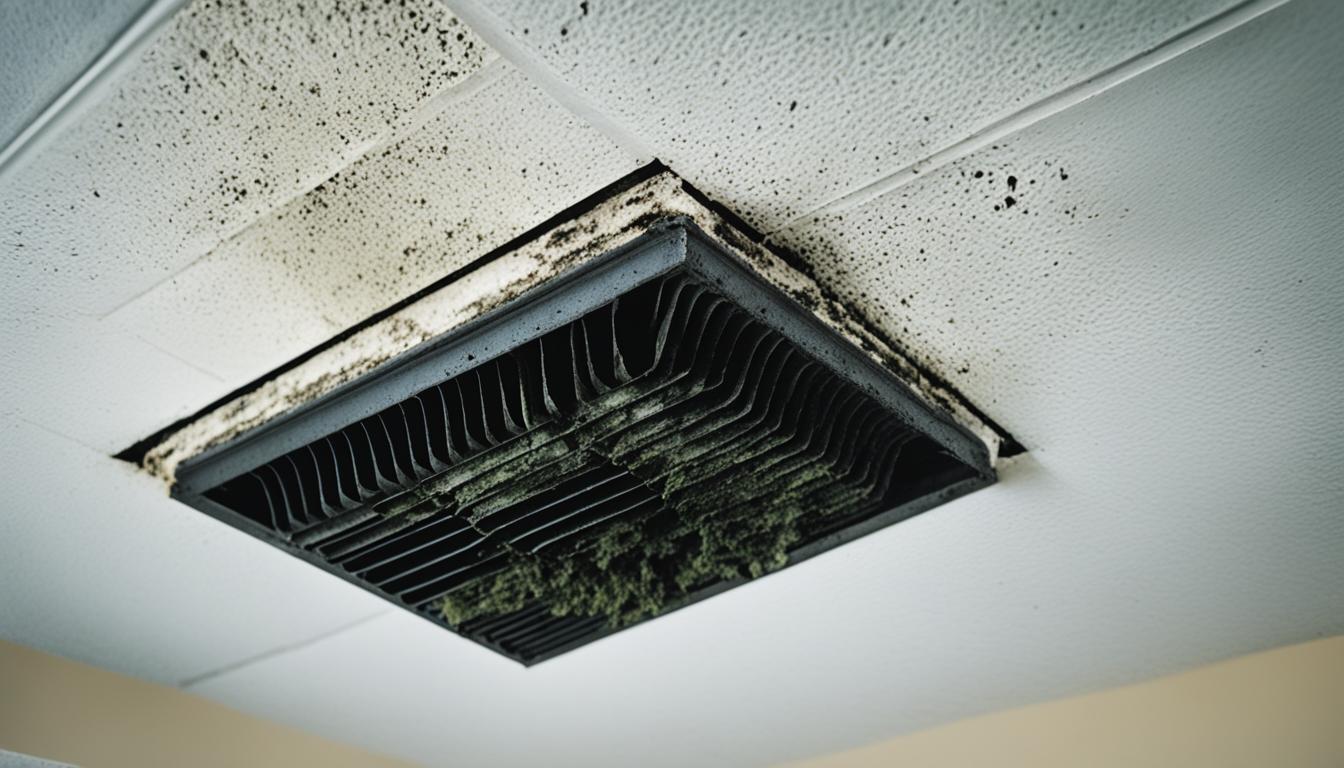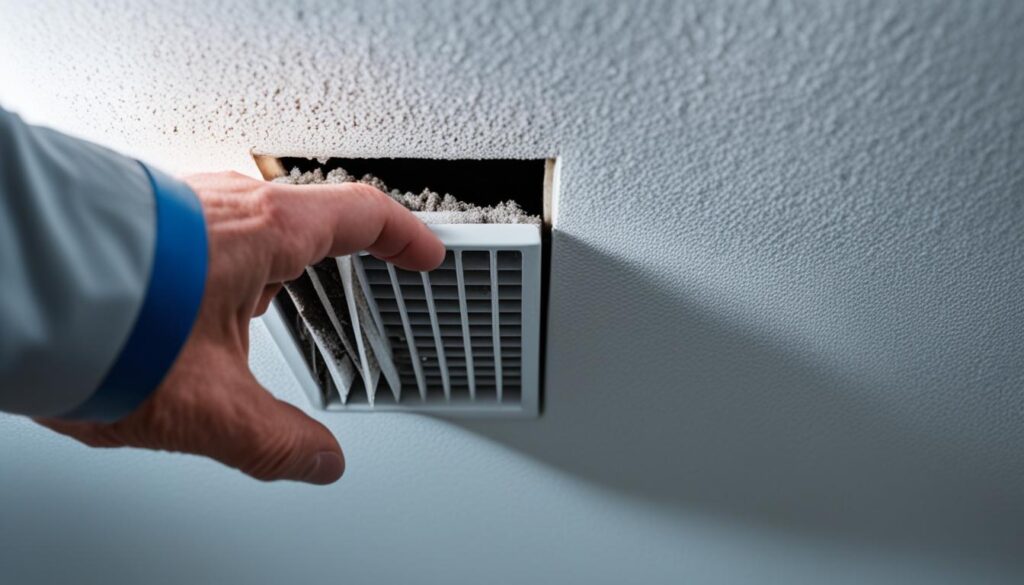
Unlocking the Mystery of Mold in ac vents: What You Need to Know
Welcome to our comprehensive guide on dealing with mold in AC vents. Are you concerned about maintaining a cleaner and healthier home environment? Mold in AC vents can be a significant issue, affecting both the air quality and the overall comfort of your living space. In this article, we will explore the causes and dangers of mold growth, provide tips for detecting mold in AC vents, and offer practical strategies for prevention and remediation. Additionally, we will emphasize the importance of a professional mold assessment to ensure accurate and thorough evaluation. Let’s dive in!
Key Takeaways:
- Mold in AC vents can lead to a compromised home environment, affecting both air quality and overall well-being.
- Understanding the causes and dangers of mold growth in AC vents is crucial for effective prevention and remediation.
- Detecting mold in AC vents can be done by identifying common signs such as a musty odor or visible mold growth.
- Preventive measures, such as maintaining proper humidity levels and regular AC system maintenance, can help minimize the risk of mold.
- Professional mold assessment services provide accurate and comprehensive evaluations to address mold issues effectively.
Understanding the Causes and Dangers of Mold in AC Vents
In this section, we will delve into the causes of mold growth in AC vents and the potential dangers it poses to your health. It is important to understand the various factors that contribute to mold formation in order to take proactive measures to prevent its growth and protect your home and family.
Mold thrives in environments with high humidity levels and poor ventilation. This is why AC vents can become breeding grounds for mold if not properly maintained. Moisture from condensation, leaks, or excessive humidity can accumulate in the ventilation system, providing the ideal conditions for mold spores to grow and multiply.
When mold spreads in AC vents, it becomes a serious concern for the health of everyone living in the house. Mold exposure can trigger respiratory issues, allergic reactions, and even cause more severe health problems, especially for individuals with pre-existing conditions or weak immune systems.
Mold-contaminated air circulating through the AC system can significantly impact the indoor air quality, leading to symptoms such as:
- Coughing and sneezing
- Shortness of breath
- Nasal congestion
- Throat irritation
- Headaches
- Worsening of asthma symptoms
- Allergic reactions
It is crucial to address mold growth in AC vents promptly to prevent further contamination and potential health risks. Regular inspections, maintenance, and prompt remediation are key to keeping your home environment healthy and mold-free.
Remember, prevention is always better than cure. By taking proactive measures to ensure proper ventilation and control humidity levels, you can minimize the risk of mold formation in your AC vents and maintain a safe living space for you and your loved ones.
In the next section, we will provide you with practical tips on how to detect mold in your AC vents, helping you become better equipped to tackle this issue.
Mold Growth Factors:
| Causes of Mold Growth in AC Vents | Dangers of Mold Exposure |
|---|---|
| High humidity levels | Respiratory issues |
| Poor ventilation | Allergic reactions |
| Condensation or leaks | Worsening of asthma symptoms |
| Excessive moisture | Headaches and throat irritation |
Tips for Detecting Mold in AC Vents
When it comes to mold in your AC vents, early detection is key to preventing further issues and ensuring a healthier home environment. By learning how to identify the signs of mold growth, you can take immediate action and minimize the potential risks. Here are some practical tips to help you detect mold in your AC vents:
- Look for visible mold growth: Inspect your AC vents for any visible signs of mold, such as black or green patches. Mold can often appear as a fuzzy or slimy texture.
- Follow your nose: One of the most common signs of mold in AC vents is a musty or moldy odor. If you detect a persistent unpleasant smell, it could indicate mold growth in your ventilation system.
- Pay attention to allergic reactions: If you or your family members experience unexplained allergic symptoms like sneezing, coughing, or itchy eyes whenever the AC is in use, it could be a sign of mold contamination.
- Check for water leaks: Mold requires moisture to grow, so keep an eye out for any water leaks or condensation around your AC vents. Water stains or dampness could be an indication of mold development.
Regularly inspecting your AC vents for these signs and taking immediate action if you suspect mold contamination is crucial to maintaining a cleaner and healthier home environment.
If you’re unsure about the presence of mold or want a professional assessment, contact Fix Mold Miami at 305-465-6653 for reliable mold detection and expert advice.

Image: An image depicting a person inspecting an AC vent for mold growth.
Tackling Mold in AC Vents: Prevention and Remediation
In order to effectively manage mold in your AC vents, it is crucial to implement preventive measures and seek professional assistance when needed. By taking proactive steps and addressing the issue promptly, you can ensure a healthier and mold-free home environment.
Preventive Measures for Mold Prevention
Preventing mold growth in your AC vents starts with regular maintenance and upkeep. Here are some strategies to consider:
- Maintain proper humidity levels in your home to discourage mold growth. A relative humidity of 30-50% is recommended.
- Clean and replace air filters regularly to prevent dirt, dust, and moisture buildup.
- Ensure proper ventilation in your home, especially in areas prone to moisture accumulation like bathrooms and kitchens.
- Inspect and clean your AC system’s condensate drain line to prevent clogs that can lead to excess moisture.
- Keep your home well-insulated to minimize condensation and moisture seepage.
Professional Mold Remediation
While preventive measures can significantly reduce the risk of mold growth, there may be situations where professional assistance is necessary. Here’s when to consider mold remediation services:
- Extensive mold contamination: If the mold problem in your AC vents is widespread or covers a large area, professional remediation is recommended. Trained experts have the knowledge, experience, and equipment to effectively remove mold and restore your ventilation system.
- Health concerns: If you or your family members experience persistent respiratory symptoms, allergies, or other health problems that are likely linked to mold exposure, seeking professional assistance is crucial. Mold remediation experts can identify the root cause of the issue, eliminate the mold, and improve the air quality in your home.
- Complexity of the job: Mold remediation can be a complex and delicate process. Professionals can navigate the intricacies of the task, ensuring a thorough and lasting solution. They have access to specialized tools and techniques that may not be available to homeowners.
When it comes to mold prevention and remediation in your AC vents, it’s essential to take a proactive approach and seek professional assistance when needed. By implementing preventive measures and enlisting the expertise of trained mold remediation professionals, you can maintain a clean and healthy home environment for you and your family.
Conclusion
In conclusion, addressing mold in AC vents is essential for maintaining a cleaner and healthier home environment. Mold growth in AC vents can lead to poor indoor air quality and potential health risks for you and your family. Understanding the causes and dangers of mold in AC vents is the first step towards creating a mold-free home.
By implementing preventive measures, such as controlling humidity levels and regularly cleaning and maintaining your AC system, you can reduce the risk of mold growth in your vents. Additionally, it’s important to be proactive in detecting mold by looking out for visible signs like musty odors or visible mold growth. Taking immediate action when you suspect mold contamination can prevent further damage to your home and your health.
If you suspect mold in your AC vents, it’s advisable to seek professional assistance for a comprehensive mold assessment. A professional mold assessment will provide you with an accurate evaluation of the extent of mold contamination in your vents, helping you determine the most appropriate remediation approach. When it comes to mold, it’s always better to address the issue promptly and effectively, ensuring a cleaner and healthier environment for you and your loved ones.
Contact Fix Mold Miami at 305-465-6653 for a professional mold assessment and take a proactive step towards a mold-free home. Breathe easier and enjoy a cleaner, healthier living space.




